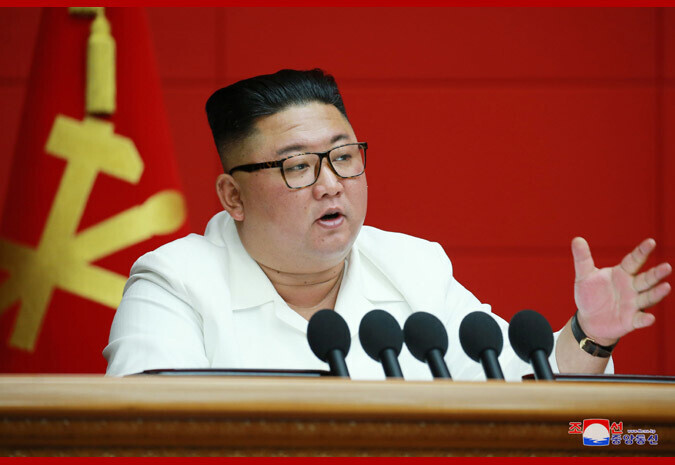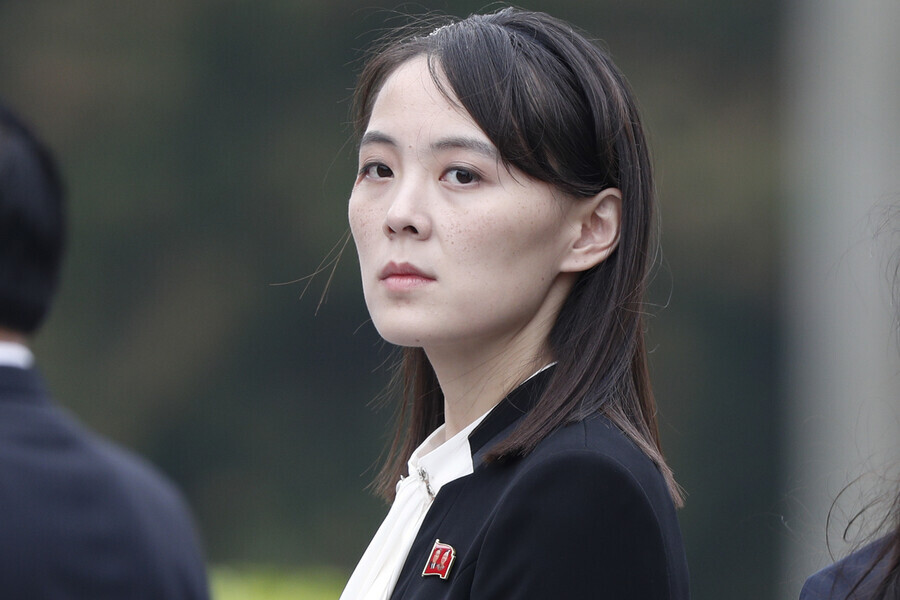hankyoreh
Links to other country sites 다른 나라 사이트 링크
[News analysis] The potential reasoning behind Kim Jong-un’s delegation of authority

On Aug. 20, the National Intelligence Service (NIS) reported on changes in North Korea’s power structure during a plenary session of the National Assembly Intelligence Committee. Whereas former North Korean leaders Kim Il-sung and Kim Jong-il monopolized all power as the supreme leader, Kim Jong-un, nine years after taking power, has delegated authority and responsibility to his younger sister Kim Yo-jong, first deputy director of the Central Committee of the Workers’ Party of Korea (WPK), and other key officials. In effect, this represents a division of roles.
According to accounts of Thursday’s NIS briefing by Democratic Party lawmaker Kim Byung-kee and United Future Party lawmaker Ha Tae-keung, Kim Yo-jong has been instructed by her older brother to play a major role in the areas of inter-Korean policy and US strategy. Whereas the North Korean leader was formerly briefed directly by each respective government agency, his younger sister now occupies an intermediary role where she can brief him and then receive instructions to relay to lower officials. Kim Jong-un retains ultimate decision-making authority, of course, but Kim Yo-jong collects and oversees each agency’s reports.
A similar delegation of authority can be witnessed in other areas. State Affairs Commission Vice Chairman Pak Pong-ju and Premier Kim Tok-hun are sharing responsibility for the economy. And in regard to the military, WPK Military Affairs Guidance Department Director Choi Pu-il is overseeing the armed forces, while WPK Central Military Commission Vice Chairman Ri Pyong-chol is heading up the development of strategic weapons.

Kim Yo-jong’s status as “de facto number-two person”
It seems clear that Kim Yo-jong’s status is superior to that of other party leaders, as confirmed by the NIS’ description of her on Thursday as the “de facto number-two person,” the first time it’s referred to her as that. But the NIS explained that Kim Jong-un has not named her his successor.
During its briefing, the NIS used the term “mandate” to describe the authority that had been given to Kim Yo-jong. Ha Tae-keung clarified that this means that “Kim Jong-un still exercises absolute power, but will gradually hand down authority he’s previously held,” and a NIS official reconfirmed that the term in question meant that “authority has been delegated.”
“This is basically the same as government ministers giving approval because the president can’t do everything. The important thing is that [Kim Jong-un calls the shots],” Kim Byung-kee said.
Efficiency and reducing stress on Kim Jong-un through changes to system of ruleSouth Korean intelligence believes that the primary objective of these changes to the system of rule is to reduce stress on Kim Jong-un. A secondary objective is connected with risk management: namely, spreading out responsibility for failed policies that would otherwise weigh down the supreme leader. Another possible interpretation is that Kim is delegating his authority in order to increase governing efficiency and normalize the operations of the state based on his confidence that he has a firm grip on power and ample governing experience nine years into his rule.
“Since Kim is in good shape, he’s delegating authority and responsibility to appropriate figures in areas such as the economy, society, military, and foreign affairs while supervising politics himself. This can be seen as Kim’s tactical approach to political management. Divvying up roles in this way shows the stability of Kim’s hold on power,” said Yang Moo-jin, a professor at the University of North Korean Studies.
In fact, such changes in the ruling structure have been repeatedly detected since Kim came to power. “We’ve continued to discover changes in the ruling style under Kim Jong-un that were not seen under his father, Kim Jong-il. Kim Jong-un has already been moving to strengthen the roles of key officials in the Party,” said a former high-ranking government official who is well-versed with the situation in North Korea.
By Noh Ji-won and Seo Young-ji, staff reporters
Please direct comments or questions to [english@hani.co.kr]

Editorial・opinion
![[Column] When ‘fairness’ means hate and violence [Column] When ‘fairness’ means hate and violence](https://flexible.img.hani.co.kr/flexible/normal/500/300/imgdb/original/2024/0516/7417158465908824.jpg) [Column] When ‘fairness’ means hate and violence
[Column] When ‘fairness’ means hate and violence![[Editorial] Yoon must stop abusing authority to shield himself from investigation [Editorial] Yoon must stop abusing authority to shield himself from investigation](https://flexible.img.hani.co.kr/flexible/normal/500/300/imgdb/original/2024/0516/4417158464854198.jpg) [Editorial] Yoon must stop abusing authority to shield himself from investigation
[Editorial] Yoon must stop abusing authority to shield himself from investigation- [Column] US troop withdrawal from Korea could be the Acheson Line all over
- [Column] How to win back readers who’ve turned to YouTube for news
- [Column] Welcome to the president’s pity party
- [Editorial] Korea must respond firmly to Japan’s attempt to usurp Line
- [Editorial] Transfers of prosecutors investigating Korea’s first lady send chilling message
- [Column] Will Seoul’s ties with Moscow really recover on their own?
- [Column] Samsung’s ‘lost decade’ and Lee Jae-yong’s mismatched chopsticks
- [Correspondent’s column] The real reason the US is worried about Chinese ‘overcapacity’
Most viewed articles
- 1China calls US tariffs ‘madness,’ warns of full-on trade conflict
- 2[Column] US troop withdrawal from Korea could be the Acheson Line all over
- 3[Editorial] Yoon must stop abusing authority to shield himself from investigation
- 4[Column] When ‘fairness’ means hate and violence
- 5[Column] How to win back readers who’ve turned to YouTube for news
- 6US has always pulled troops from Korea unilaterally — is Yoon prepared for it to happen again?
- 7[Book review] Who said Asians can’t make some good trouble?
- 8Naver’s union calls for action from government over possible Japanese buyout of Line
- 9Could Korea’s Naver lose control of Line to Japan?
- 10[Editorial] Korea must respond firmly to Japan’s attempt to usurp Line